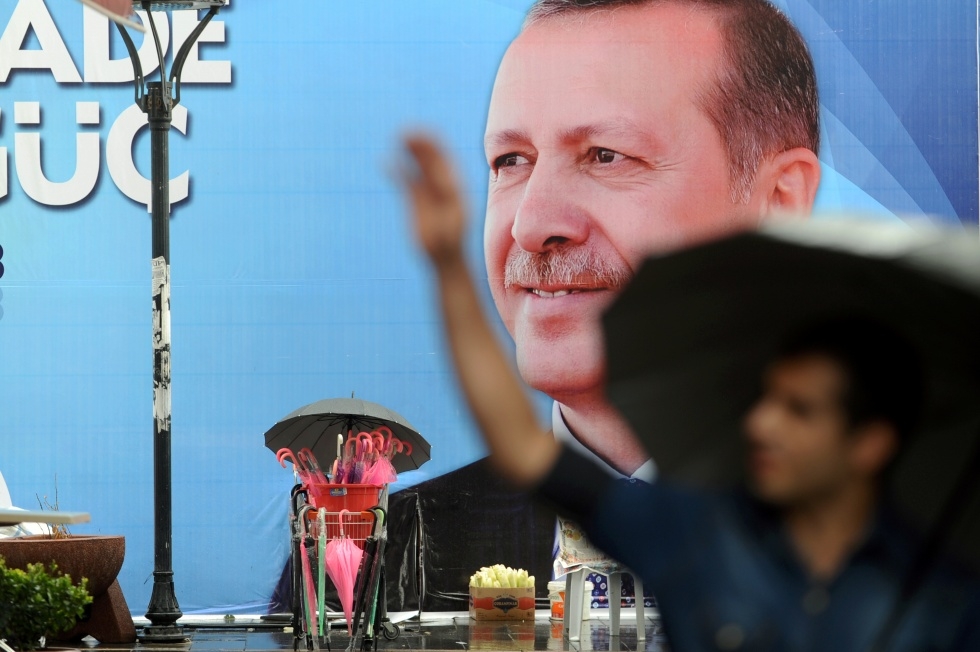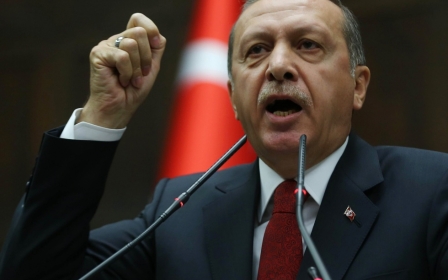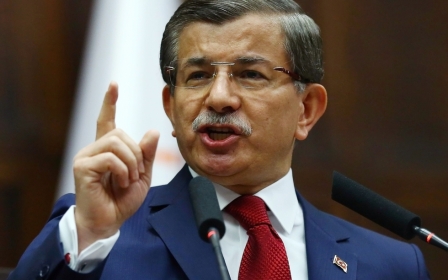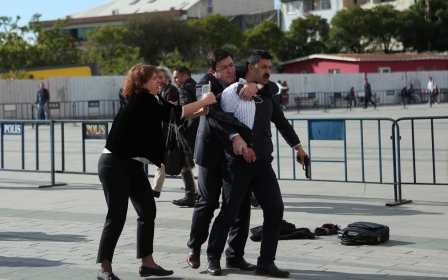ANALYSIS: Erdogan plays game of bluff with EU, and cannot lose

ISTANBUL, Turkey – Following the resignation of his prime minister, President Recep Tayyip Erdogan wasted no time in issuing Europe its most chilling warning yet, when he alluded to the possibility of discontinuing all negotiations with Brussels. But this parting of ways could leave Turkey, the European Union and Syrian migrants all worse off, say analysts.
“I am sorry - we are going our way, you go yours,” Erdogan said on 6 May, a day after Ahmet Davutoglu announced he was stepping down as prime minister out of necessity rather than choice.
Davutoglu’s resignation removed any doubts that Erdogan is now heading a de facto executive presidency system even if the constitutional legality of such an action remains debatable.
Many political observers say Erdogan is implementing his style of abrasive and confrontational politics, which has proved very successful domestically, on the European stage now.
Sensing European fear about a potential influx of migrants, Erdogan is pressing hard to ensure that Turkey does not lose out again in the face of what he terms European “hypocrisy”.
Erdogan’s remark on 6 May was in response to a requirement that Ankara amend its anti-terrorism legislation, part of 72 criteria that need to be met before a visa deal is agreed with the EU.
Turkey currently defines terrorism to include non-violent political activities - meaning people are frequently tried for engaging in propaganda on behalf of a terrorist group. The EU is seeking a more rigid definition that would make prosecutions harder.
The visa deal will allow Turkish citizens short-term, visa-free travel to the Schengen area.
Sources close to the presidential camp told Middle East Eye that there is no opposition to the deal in its entirety but only discomfort with the vagueness of the wording regarding the recommendation to amend anti-terrorism legislation.
A message released by the Turkish presidency on Monday, Europe Day, read: "As Turkey we feel that the EU needs to display a more determined stance in the fight against terror."
The message also stated that EU membership remained a strategic goal for Turkey.
Erdogan's win-win
In any event, Erdogan finds himself in a win-win situation. If Europe accedes to his demands, he shows that his style of politics is effective. And if the entire negotiation process with the EU breaks down, he wins with his conservative support base who will see it as standing up to European hypocrisy.
As far as Ankara is concerned, the deal reached with the EU on 18 March on the return of migrants, the visa exemption agreement and the re-admission agreement of 2013 are all interlinked, even if the EU wishes not to see it that way.
“Erdogan always had the upper hand. What is happening now is that he is trying to send a clear message to those Europeans who sought to bypass him and also sought to hamper Angela Merkel’s attempts at a deal with Turkey,” said Mensur Akgun, the chairman of international relations at Istanbul’s Kultur University.
"The message is that Erdogan is the main interlocutor as far as any deal with Turkey goes. But I don’t think he actually wants to jeopardise the entire deal that was agreed on 18 March."
However, the possibility of all deals with the EU collapsing does exist, according to Akgun, who says such an outcome will be to the detriment of both Turkey and the EU.
The collapse of the visa deal could have domestic political repercussions as well.
“Many Turkish citizens have suffered humiliation and hardship queuing up in front of European consulates for visas for years now. They are not going to be very pleased with Erdogan if he is seen as being responsible for this agreement not materialising,” said Akgun.
Other fears
Eser Karakas, a professor at Istanbul University’s college of economics, said while Erdogan might be willing to lose a few political brownie points over the collapse of the visa deal, he has bigger things to fear.
“The prospect of changing the definition of terrorism and the part about corruption legislation, i.e. GRECO compliance, is not appealing at all to Erdogan,” Karakas told MEE. GRECO stands for the Group of States against Corruption established by the Council of Europe.
“On the terrorism front, scores of political opponents are being investigated under an oxymoronic definition of terrorism that makes people part of an unarmed terrorist group.
"On the corruption and money-laundering front, we have $10bn-14bn invisible and unaccounted funds annually entering the Central Bank’s coffers. Those are huge sums.”
Karakas also says the scuppering of the visa deal with the Europeans might even win Erdogan more support.
“If we have Islamophobia in the West, we also have Europhobia here. Erdogan could even increase his support among certain sections of society for standing up to the Europeans and putting them in their place.”
Existential matter
Erdogan will succeed in making the EU sing his tune since it is likely to close its eyes to many of Turkey’s shortcomings in the field of democracy, human rights and the increasingly authoritarian stance of Erdogan simply because it sees migration as an existential issue that needs to be resolved by any means, according to Karakas.
But, he said, this short-term approach would ensure that migration becomes an even bigger problem for Europe in the future.
“Europe’s willingness to forego all its core principles in the short term to get a deal on migration will not be remembered fondly," said Karakas. "And it certainly will make the situation worse because a Turkey with limited democracy, [poor] human rights and more instability will mean more migration to Europe in the future."
In Akgun’s opinion, Turkey has a valid grievance against the Europeans even if it is being expressed in an unsubtle manner.
“Replace those PKK [Kurdistan Workers’ Party] tents with their flags and banners in Brussels and Strasbourg with those of the Islamic State [IS] group or the al-Nusra Front. Do you think they would still allow them to be displayed so freely?” said Akgun. “The PKK is a serious problem for Turkey and Erdogan’s remarks to Europe were primarily based on this approach of theirs.”
Europe is unlikely to go against its core principles to accommodate Erdogan but it would be “wise for Europe to pay more attention to what he is saying” if it doesn’t want to lose Turkish cooperation, Akgun added.
End of Euro dream?
There are fears that an almost century-old dream of many Turks to become part of Europe might be at risk of ending due to Erdogan’s strong stance towards the EU, but Akgun says the Europeans are just as much to blame for this.
“We have been at Europe’s gates for more than 50 years now and are still waiting to be let in. During this time so many promises have been broken or simply ignored. Ever since the Ankara treaty of 1963 (which set up the future accession of Turkey to the EU) it has been one undelivered promise after another on the part of Europe.”
All sides will be responsible for the collapse of the visa deal and the migrant deal as a consequence, and those who stand to suffer the most will again be Syrian refugees.
“The Syrian refugees will suffer most because the six billion euros in aid to help them won’t materialise. Europe will suffer as it faces an uncontrolled rush of migrants for its borders and Turks will suffer to an extent because their dreams of freely travelling within Europe will be dashed,” said Akgun.
New MEE newsletter: Jerusalem Dispatch
Sign up to get the latest insights and analysis on Israel-Palestine, alongside Turkey Unpacked and other MEE newsletters
Middle East Eye delivers independent and unrivalled coverage and analysis of the Middle East, North Africa and beyond. To learn more about republishing this content and the associated fees, please fill out this form. More about MEE can be found here.




